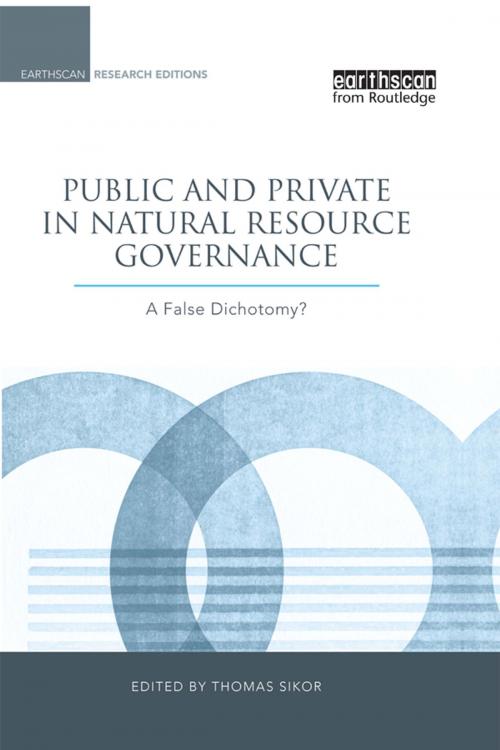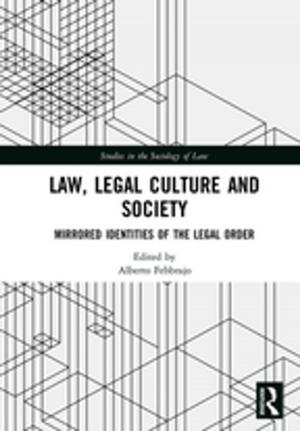Public and Private in Natural Resource Governance
A False Dichotomy?
Nonfiction, Reference & Language, Law, Natural Resources| Author: | ISBN: | 9781136535291 | |
| Publisher: | Taylor and Francis | Publication: | May 13, 2013 |
| Imprint: | Routledge | Language: | English |
| Author: | |
| ISBN: | 9781136535291 |
| Publisher: | Taylor and Francis |
| Publication: | May 13, 2013 |
| Imprint: | Routledge |
| Language: | English |
�This volume develops the rich conceptual and empirical content of public-private relationships, increasingly acknowledged as the dominant realm of natural resource governance. Ten wonderful studies from around the world illuminate opportunities for advancing the theory, analysis and effective formation of sustainable systems of resource use. The book is excellent for courses in governance and public policy in any resource and environmental field.� JEFF ROMM, PROFESSOR FOR RESOURCE POLICY, UNIVERSITY OF CALIFORNIA AT BERKELEY, US �The book addresses the theoretically and politically most important division of social organization into public and private. The authors bring an exciting, multidisciplinary perspective to bear on changing and multiple publics and the strength of relationships connecting these two spheres in rural development and natural resource governance. The contributions range from consumer health and food safety, soil science, forestry and water management to sociological and economic aspects of natural resource property and governance.� FRANZ VON BENDA-BECKMANN, MAX PLANCK INSTITUTE FOR SOCIAL ANTHROPOLOGY, GERMANY Natural resources have historically been considered as being governed in public or private spheres - that is, by the state on behalf of the people, or by companies or individuals driven by the market. This dichotomy between private and public is now recognized as overly simplistic, and it is clear that �publics� and �privates� operate at a range of levels and with differing degrees of separation or overlap. Bringing together a group of internationally respected researchers, this book provides a new perspective on prominent issues in resource governance, including the state, NGOs, civil society, communities, participation, devolution, privatization and hybrid institutions, highlighting the three-dimensional nature of relations between �public� and �private�. It builds on empirical analyses from six fields of natural resource governance - agri-environment, biodiversity, bioenergy, food quality and safety, forestry and rural water - and employs a comparative approach that goes beyond the specifi cities of individual policy fields, recognizing shared elements and allowing for a greater understanding of the dynamics underlying governance processes. Introductions to the volume and to each section summarize the key debates and highlight linkages between chapters. This is essential reading for academics, students and policy experts in natural resource governance, development and environmental policy.
�This volume develops the rich conceptual and empirical content of public-private relationships, increasingly acknowledged as the dominant realm of natural resource governance. Ten wonderful studies from around the world illuminate opportunities for advancing the theory, analysis and effective formation of sustainable systems of resource use. The book is excellent for courses in governance and public policy in any resource and environmental field.� JEFF ROMM, PROFESSOR FOR RESOURCE POLICY, UNIVERSITY OF CALIFORNIA AT BERKELEY, US �The book addresses the theoretically and politically most important division of social organization into public and private. The authors bring an exciting, multidisciplinary perspective to bear on changing and multiple publics and the strength of relationships connecting these two spheres in rural development and natural resource governance. The contributions range from consumer health and food safety, soil science, forestry and water management to sociological and economic aspects of natural resource property and governance.� FRANZ VON BENDA-BECKMANN, MAX PLANCK INSTITUTE FOR SOCIAL ANTHROPOLOGY, GERMANY Natural resources have historically been considered as being governed in public or private spheres - that is, by the state on behalf of the people, or by companies or individuals driven by the market. This dichotomy between private and public is now recognized as overly simplistic, and it is clear that �publics� and �privates� operate at a range of levels and with differing degrees of separation or overlap. Bringing together a group of internationally respected researchers, this book provides a new perspective on prominent issues in resource governance, including the state, NGOs, civil society, communities, participation, devolution, privatization and hybrid institutions, highlighting the three-dimensional nature of relations between �public� and �private�. It builds on empirical analyses from six fields of natural resource governance - agri-environment, biodiversity, bioenergy, food quality and safety, forestry and rural water - and employs a comparative approach that goes beyond the specifi cities of individual policy fields, recognizing shared elements and allowing for a greater understanding of the dynamics underlying governance processes. Introductions to the volume and to each section summarize the key debates and highlight linkages between chapters. This is essential reading for academics, students and policy experts in natural resource governance, development and environmental policy.















